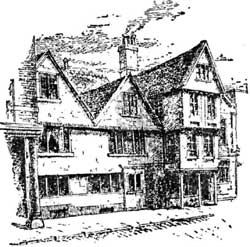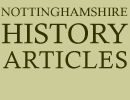About Nottingham taverns
By John Potter Briscoe
THE five published volumes of "Records of the Borough of Nottingham" (A.D. 1155-1702) contain numerous references to taverns, their keepers, and their customs; throw a considerable amount of light upon the practices of both keepers and customers; and indicate the feelings of the powers that were, from time to time, in respect to the management or otherwise of these public houses of accommodation.
These references are chiefly in respect to disorderly conduct; harbouring undesirable people; charging for ale beyond the price fixed by the authorities; giving short measure; keeping late hours; drinking during service hours on Sundays; permitting customers to run up heavy scores; selling without licenses; the excessive number of ale-houses; and non-burgesses ale-sellers. Our notes extend from 1363 to 1688—a period of three centuries—but only a few representative entries are given here, (in English): —
1467-8. "Letitia Dodworth and Elizabeth Fox made line with our Lord the King by reason of their bad conduct and disgraceful ordering and keeping of a tavern throughout the ninth hour of the night, against the ordinance of the town of Nottingham : half a mark. She has day in order that she go out of the town before the ninth day of April."
1522. "We of the Const [abulles] Quest present:— Item we preysent Thomas Stabollys for sellying alle a boffe they Mayrys prysse."
1533. "We presentt Helene Attewell' for because she wylle not selle ale acordying to Mester Mayre cummandementt forth of hyr howse by mesure." This woman was known as "Ellyn of the Hye Payment."
1587. "We present the alle howses in Carter Gate, namly Bartle Granby (iiij) and Nycholas Walser (iiij) becausse they are nott able to lodge straungers nor mete to be alehowsses."
1589. "Also we request that their may be no alehouses nor tipling houses but such as shall be suffycient and of good report and that they be bound for the good behavyour of their house and that alle such parsons as shall resort to their housses take their rest in dew tyme at the nyght uppon a paynne."
1593. "We request you Maister Meare, that all the alhousses of the back syd (Parliament St.) of the town may be loukte tow."
1613. "Wee present that ther is no refformacion conserning the inffinitt nomber of all houses within this towne, considering yat the ben continually spoken of both att Assises and Sessions, and yet nothing amended conserning the same."
1619. "Wee wishe and ernesly pray allsoe for ye nombour of aleshouses, ther is no reformacion, but still are permitted as hertofore, and allsoe strangers taken in yat, when all trades feaylle, turne tiplers; every nooke of ye back side (Parliament St.,) suffered typlers in like sort, which will in ye end cum to sumthing: therefore we humbly pray a little care herein, and yat therafter things may bee a little more thought of and refourmed."
1619. Wee present Richard Willson the alehowse keeper for receavinge of people into his howse att one of the clocke in the nighte.—Fyned and payd."
- "Wee present Edward Tuten for a lewde frequentor of allhouses in tyme of devyne servic.—Vs."— "We present Robard Hope for keping of company in his howse in Servis tym. . . . iijs. iiijd. a peice."
- "Item we intreate Master Mare Worship and the rest of his bretheren on the Bench that the will tacke somm order for the allemen, which selle alle in the town and be no burgesses.—Done."
1630. "We presente Samuel Willdye for sufferinge sundrye persons to drinke in his house. ... till their shott Came to 7s., and, in the end, fell out aboutt the payinge of itt: xs."
1640. "Item, we present Richard Smith for denyeinge to sell a pennyworth of ale out of doors: iijs. iiijd."
About thirty-five years ago we obtained for the Free Public Reference Library an original manuscript—the Orders to the Garrison at Nottingham signed by Colonel Hutchinson and William Nix, the "Major" of Nottingham, dated Dec. 1644. These "orders" appeared in the late Mr. Hine's work—"Nottingham: its Castle—a Military fortress, a Royal palace, a Ducal mansion, a blackened ruin"—The following references are extracted direct from the document:—
"2. If anyone shall bee found drinkinge in any Taverne, Inne, or Alehouse on the sabath or fast day, hee shall pay 1s., or suffer imprisonmt till hee pay the same; And the mr of that house shall pay for every pson soo taken in it 1s., and if hee offend the second tyme hee shall be disenabled for sellinge wine, ale, or beare any more."
3. If any Taverne, Inne, or Alehouse soever shall sell any wine, ale, or beare out of their houses upon the sabath or fast day (except to anyone who is sick), for the first time he shall pay (?) 10d., for the second 1s., and for the third disenabled for sellinge any wine, ale, or beare any more."
"7. If anyone shall be drunke, hee shall pay five shillings, or suffer imprisonmt till hee pay the same; and the mr of the house where he was made drunke shall pay 1s., and likewise suffer imprisonmt till hee pay the same."
"8. If anyone shall be found tiplinge or drinkinge in any Taverne, Inne, or Alehouse, after the hours of nyne of the clock at night, when the Tap-too beateth, hee shall pay 2s. 6d.; And the house for the first tyme shall pay 2s. 6d., for every man so found, and the second tyme 5s., and for the third tyme bee disenabled for sellinge wine, ale, or beare any more."
"10. If any Taverne, Inne, or Alehouse soever shall sell any wine, ale, or beare (except upon an extraordinary occasion to one that is sick) after the houre of nyne of the clock at night, after the taptoo hath beaten, untill the Revelly hath beaten the next morninge, hee shall pay 1s., or suffer imprisonmt till hee pay the same; and hee who fetchets the drinke after the aforesaid houre shall pay 2s. 6d., or suffer imprisonmt till he pay the same." "Whosoever shall give Information of any pson who shall comitt any of these offences, he shall have halfe the penalties sett upon them for his reward."
Under the year 1647 is this extract from the Presentments at the Sessions. Circa 14 April 1647. "To the right Worshippfull Maister Major, Maister Recorder, and the rest of the Aldermen of the Towne of Nottingham; The petition of divers of the Burgesses of the Towne of Nottingham whose names are here subscribed Sheweth That whereas your petitioners (by sad experience), have observed that by permitting soe many unnecessary Alehousses and Tipling houses Within this towne, the name of God is much dishonored, His day profaned, and his cretures abused, and . . . permitting soe many strangers within . . . mault and Tiple, your Burgesses and free [men] . . . [muc]h oppressed, and disenabled . . . for prevention of these inconveniencyes, wee humbly desire your woorshipps to suppresse the unnecessary number of Alehousses, and to suffer non to mault within this Corporation but such as are members of this body, and for which favoure your petitioners shall ever pray."
1648. "Agreed, the Alehouse-Keepers that are not yet burgesses shall not bee made burgesses."
1685. "Wher[e] as William Parnham was discharged from Malting in this Corporacion, being a Forrainer, according to an order made in ye Quarter Sessions, he being not a Freeman of the said Corporacion, He, the said William Parnham, submitting himselfe, and paying X li (£10) for the use of the said Corporacion, to be made a Freeman thereof, It is ordered therefore that He, the said William Parnham, shall [be] made Burgess, takeing the Oaths as ye Statute appoints."

The Flying Horse.
To deal with the signs of Nottingham "places of entertainment for man and beast" would occupy more space than is available for this subject, interesting as it is. Even to treat of the ancient inns and taverns is not possible here: besides this has been done during recent years elsewhere. We, however, present a note about "The Flying Horse" in the Poultry which still remains to remind us of former days. As to the. origin and significance of the sign of this hostelry. This may have had reference to the winged horse on which Bellerophon rode against the Chimaera, in the classic mythology, and which was known as "Pegasus," or "Pegasos"=the horse of the Muses. Or it might have had an heraldic meaning as the Pegasus on a field argent is the armorial bearing of the Templars. Probably, as the historian of signboards suggest, "besides its mythological and heraldic origin, there was another reason which sometimes prompted the choice of this sign. It was the name of a popular amusement, which consisted in a swing, the seat of which formed a wooden horse. This the flying equestrian mounted, and as it was swinging to and fro he had to take with a sword the ring off a Quintain. If he succeeded, his adroitness was, no doubt, rewarded either with a number of swings gratis, or a quotum of beer. Swings, roundabouts, and such-like amusements, were
[in the days of Queen Anne and before] the usual appendages of suburban alehouses, and to a certain extent have even come down to our time." In a curious work entitled "Guide for Malt-worms," published about 1720 is a crude representation of the "flying-horse." The first definite information respecting the site of "The Flying Horse," in our possession, is of the year 1400 when John de Plumtre of Nottingham, made an instrument of foundation for what is still known as "Plumtre Hospital." The property forming the endowment included the oldest portion of The Flying Horse in The Poultry and the side in Peck Lane, and all the adjoining portion on the east side of that narrow thoroughfare down to St. Peter's Gate, or "Peter Gate"—the name by which it is now generally known. It cannot be stated with certainty when the present building became an inn or tavern, but it is of the Elizabethan period, with some of its sub-structure of earlier date. In 1799 "The Flying Horse " was in the possession of one William Rowbotham. The house was described as being at the Hen Cross. Nineteen years later "mine host" was "Robert Mackley," when the inn was in "The Poultry" as always. In 1826 the rent was £63 a year. The building was in bad condition and as being scarcely habitable. It was, however, repaired and the rent increased to £100 a year : a small sum as compared with that of the same portion at the present time. In 1832 Jane Clark occupied "The Flying Horse Inn." which was then described as being No. 11 Poultry. Many years ago the house was adapted as a commercial house, which character it still retains.
To correct an erroneous impression which largely prevails it should be stated that the present Blacks' Head Vaults at the corner of High Street and Smithy Row is not the "Blackamoor" where Byron's corpse rested on its way to Hucknall Torkard.
